#bund area
Note
I am feeling very conflicted because I want to do more activism but I live in a very isolated area, and the one organization that works here that I even remotely align with politically has had some issues with the people it's supposed to serve (immigrants in this case) complaining that it doesn't provide many services needed and some people in it are dicks. Also, the options they have to collaborate are very much not autistic friendly. At the same time, I hate the thought of sitting back and doing nothing -beyond what I already do, which is limited to people I know- because the option to do something is not perfect. What would you recommend?
It sounds as though the organization you are looking at is a nonprofit that provides social services. I would not consider working with such an organization to be activism, usually. They will present volunteering your time with them as "activism," but it's really just free labor, somewhere on the spectrum between being charitable with your time and labor exploitation.
There is very little that most nonprofits do to advance any kind of social or political change of any kind. For the most part, nonprofits function to maintain their own operations, with a side hustle of dispensing very limited resources to marginalized people who will remain just as marginalized afterward.
More on this:
If you'd like to be involved more in your community in a way that feels meaningful and that works with your disability, I would encourage you to think far more broadly than merely joining an existing easily-findable organization. That kind of search will tend to skew toward liberal, nonprofit-led, politically toothless efforts. Instead, think of what you can do to make greater contact with the people in your area who are marginalized and share struggles with you.
Can you give homeless people meals in the park and ask them how they're doing? Can you get involved in your local parks or nature reserves? (there if you're volunteering your time, at least it can be for something enriching and beneficial). Is there a local Food Not Bombs chapter? A local Muslim community center that could use safety marshalls? A local abortion clinic that could use the same? Do you have neighbors who are single parents and need childcare help? Dogsitting? Does the senior down the street need their lawn mowed?
Is there a local Facebook group where you can offer help to people in your community in need? Start saying hello to people. Asking them about their day. Asking about what's going on in the neighborhood. What needs done, who needs help, what problems are plaguing the area that nobody is doing anything about? Are there any local businesses that are discriminatory and need to be taken to account publicly? Are there forests you can help protect from deforestation with tree spiking? Is there a jail near you where you can provide jail support, handing out food and clothes and water and letting released prisoners make phone calls?
Some of this stuff might not seem like activism in the most obvious, in-your-face, picket-signs-and-banners-in-the-streets sense. But it's a lot more impactful than a lot of that is on its own. It's community building. I'd also recommend reading some stuff on the Anarchist Library website about building one's own affinity groups. You don't need a big formal organization to make a difference -- in fact, for many structural and economic reasons, it can be harder to make a difference within a large group that faces public exposure and the risk of legal censure. A few new homies in your town who care as much as you do can do a whole lot of good.
Some reading:
96 notes
·
View notes
Text
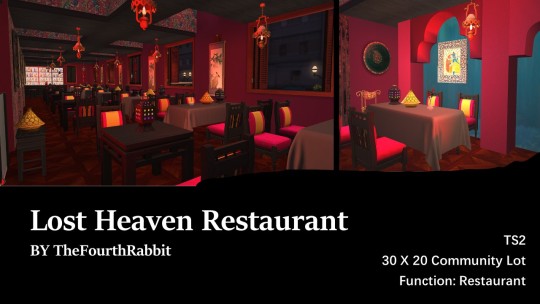
Lost Heaven Restaurant
A perfect mixture of mystery and vibe. Enjoy the exquisite dining experience which draws inspiration from Tibetan, Yunan, and Indian cuisines. Or have some Moroccan tea at the Casablanca-styled terrace bar.
Fun fact: It was based on a restaurant with the same name in Shanghai (located in the famous Bund area). I only hope I have re-captured 1% of the beauty of the actual one!
Now for DOWNLOAD (SFS)
Check this document for the main cc used in the lot.
ENJOY!

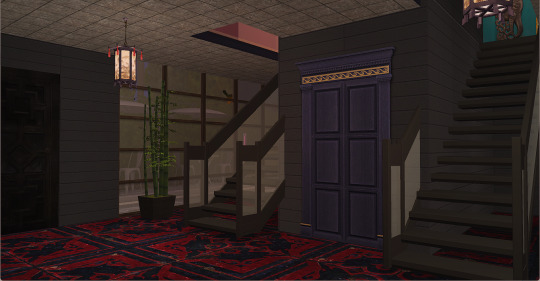

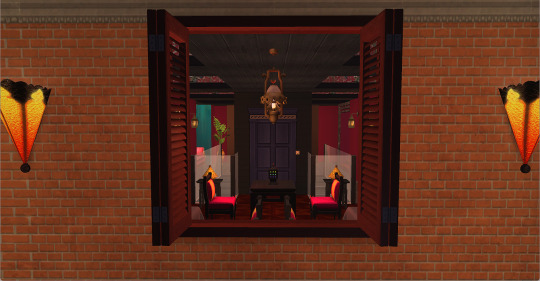



#ts2#thesims2#the sims 2#ts2 pictures#ts2 download#ts2 lot#Downtown Lot#Lost Heaven Restaurant#Sorry it took so long
88 notes
·
View notes
Text
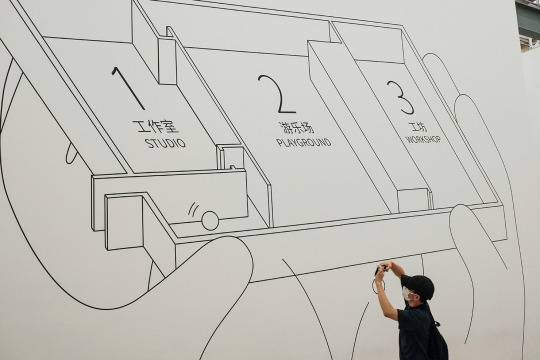
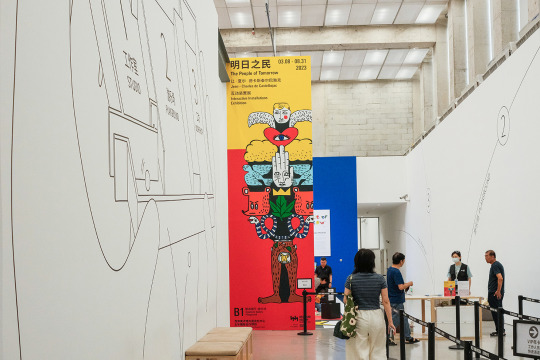

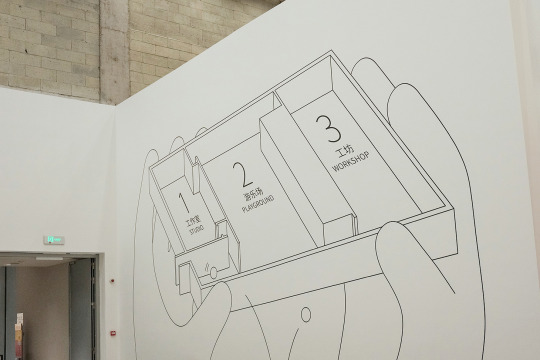


I am delighted to have designed the wayfinding illustrations for Creativity Gallery at West Bund Museum. Creativity Gallery hosts many exhibitions and activities for children, so I wanted to create a relaxed and playful atmosphere. I designed the space to resemble the "maze ruler" toy I played with when I was a kid, where a pair of large hands is moving a small ball by tilting the entire gallery, representing the current location of the viewer. The small ball falls out and bounces around in the gallery, with each area marked by bouncing balls labeled with numbers. Much thanks to West Bund Museum for the invitation.
#westbundmuseum#woshibai#我是白#西岸美术馆#design#illustration#art#illustratior#artist#art museum#museum#gallery
133 notes
·
View notes
Note
Hi RBS!
I’m very excited - I get to visit China for the first time this summer! I was wondering if you or any of your followers can think of places I should visit that have any yizhan significance (anything related to either of them separately, or both together). We’ll be in Shanghai for a week and Beijing for 4 days - we’re planning to do a couple day trips from Shanghai, Suzhou and/or Hangzhou, maybe one other if ppl have suggestions for that.
Unfortunately I don’t think we’ll make it down to Hengdian to see where CQL (& like everything else) was shot - it’s just a bit too far for a day trip + it’ll be SO hot and humid, not sure I want to go much further south than Shanghai.
Side request: if any of your followers happen to know how I would go about getting tickets to the filming of a variety show, that would be amazing (though I’m guessing a lot of them don’t allow foreigners in their audience?). Just about any variety show, I am not in a position to be picky lol
Thank you (and your followers) in advance!
Wow, porcupine-girl! I'm so jealous!!! I hope you'll share some photos on Tumblr when you get back home!
I can think of a few places I'd want to check out if I were to take such a trip:
Obviously the Gucci art wall.
Huangpu Park and The Bund area, where both GG and DD have had photo shoots in the past.


Some of the locations from GG's Shanghai Vlog (addresses in the description of this video).
Maybe readers will have more suggestions.
Have a safe and happy trip!! 😊
43 notes
·
View notes
Text
let’s talk genocide denial!!! I’ve been seeing a Lot of it and it’s very infuriating on all fronts, especially when we are facing situations with multiple genocides at play! For ref, I am not indigenous to turtle island, I am a Tagalog Jew!
1) people refusing to recognize the nakba and the state of Israel’s long-form treatment of Palestine as a form of genocide because “there are more of them now!!!” Genocide is not solely a matter of “numbers” of people alive but also the purposeful destruction of peoples and cultures, as has been enacted against Palestine.
2) this is a complex one but…. Importation of discourses of originalism and indigeneity to middle eastern and Eastern European cultural contexts where they don’t belong. While pretty straightforward on turtle island, the constant flow of people into and out of these regions has meant many groups of people have lived in the same places for hundreds or thousands of years. The claim of “certain” groups of people as being invaders or recent “imports” has been a central aspect of the justification of deportation and genocide across EE and SWANA regions. This includes Jews across Eastern Europe (middle eastern invaders!!!) Palestinians in Palestine (Arab or greek invaders!!!) Armenians everywhere (Christian invaders!!!!) Greeks in Turkey and Egypt, Bosnians in Bosnia-Herzegovina (Turkish invaders!!!) and so forth. Don’t adopt these discourses.
3) point blank labeling of antisemitism as something *fake* the Jews control. *antisemitism*
4) refusal to reckon with the extent of the Shoah and intergenerational traumas and realities of the Shoah (like other genocides.) a genocide affects not only the survivors but their descendants. I’m seeing a lot of people acting like Zionism is a particularly evil ideology the Jews cooked up and then brainwashed other Jews into believing and then everyone chose to move to Israel instead of continue living in their nice cosy Yiddish bund homeland, and that removes the goysiche agency from the story. The Shoah outright obliterated the Jewish homelands and cultural areas Jews had been living in across Europe, and any genuine antizionism or diasporism NEEDS TO LOOK that history right in the face rather than sweeping it under the rug. It NEEDS to reckon with why so many Jews came to believe that they could no longer live outside of their own state because the goyishe world told them with blood that they could no longer live outside of their own state. It also needs to deal with the fact mass numbers of Jews were pretty unceremoniously dumped from DP camps to the state of Israel after the war was over. Genocides affect the survivors for generations, including where they live.
4) refusal to recognize antisemitism in the Arab world or the contexts which forced middle eastern Jews from their homelands and into the state of Israel. Oh it must be /their fault./ see above, no effective antizionism without reckoning with these histories.
5) tankies. There’s just been a mass platforming of tankies recently and many of them engage in genocide apologism or outright denial, especially of the holodomor. Others whitewash the policies of forced cultural assimilation or land dislocation undertaken by the USSR as “necessary anti-conservative revolutionary action against reactionaries.” I don’t care what their *good stances* are, we should not platform outright genocide deniers even if they can *justify* mass killings by means of political ideologies. These ideas include the idea that any discussion of governmental violence or genocide by a non U.S.-aligned state is a western psyop invented by the U.S., and they include not only historic genocides (although as discussed, genocides are not solely “historic” in the sense they continue to affect survivors and their children for generations) but current and ongoing violence against Uighur, Kurdish, Ukrainian, and Tibetan people.
5) anti indigenous racism in turtle island. Also a complex one as I don’t want to engage in whataboutism, but a lotttt of the jokes about *just send the Israelis to New Jersey/New York/Florida* ignore the fact that New Jersey, New York, and Florida are also settler colonies and indigenous homelands. A lot of the discussion of IL by white settlers has revealed the extent that they do not view themselves as white settlers, nor do they really understand native peoples and First Nations continue to exist. “I’d let Native American Hamas kill me and it would be awesome!!!!” Well there is no Native American Hamas, but there might be a tribe in your area that needs money for new kindergarten chairs or support for landback, so you shouldn’t treat them as a vaguely existent hypothetical.
6) reimposition of the colonial notion of one land for one ethnic group with one language and only one language that can be applied to place names. Even if this is in a *decolonial* sense for one area it’s still very dangerous logic to play with, especially with the ethnic diversity of much of the world. The idea of inherent primacy of one ethnic group over another in the post colonial era has been at the root of many mass killings.
7) labeling a language as “evil” or “untrustworthy”
8) I shouldn’t have to tell you why the idea that “there are no civilians” is very bad in literally any case
130 notes
·
View notes
Text

Gates to Heck Chapter 6
Shigeo didn't bother to explain the blackmail. Joseph was a smart man. He worked for the government. He seemed to understand that Shigeo was ready to blow that secret government agency wide open, if it meant saving his best friend from a life of vigilante justice.
He could do it. If Mezato helped, but he was pretty sure she would.
"Calm down," said Joseph, when he finally answered Shou's phone. "I was already looking for Shiro-san."
"Then why didn't you say that?" asked Shou. He had put his cellphone on speaker so he could make the introductions, which he did with what Shigeo felt was an unnecessary level of formality.
"You're not supposed to make promises to civilians, Shou."
"That's cops, not government assassins, Joe."
Joseph met them at Shou's apartment, where he informed them that one of the in-custody members of Final Dog had identified their missing esper as Shiro-san. Joseph assured them that he had done so willingly.
The informant had described Shiro-san's aura as "kind of ozone-y, but with, like, a hint of mint." Shigeo concentrated hard and extended his psychic scan further than last time. Eventually he found it just beyond city limits.
He still couldn't feel Teru's aura, but it might have simply been too weak.
Shiro-san was northbound, moving faster than the speed limit, which meant he was using his powers to fly. Shigeo couldn't fly that fast without swallowing a lot of bugs.
Shiro-san stopped in a rural area called Furikake Village. Shigeo used side-along teleportation to bring everyone there, and then promptly threw up in a rice paddy.
In addition to Reigen, Ritsu, and Shou, he had used side-along teleportation to bring Joseph from the government. Shigeo needed someone to take Shiro-san into custody while they took care of Teru.
Shigeo had never carried that many people at once. He thought that might also account for his aim, which had not been as accurate as he would have hoped. They were lucky for the rice paddies. Their feet got wet, but Shigeo didn't want to think about what would have happened if he had teleported them into a cow.
It was much easier to sense Shiro-san's aura now. He could sense Teru's aura too, although it was still concerningly faint.
Reigen patted Shigeo on the back, and Shou offered him a handkerchief with only a little Cheeto dust on it. Ritsu backed away a little, clutching reflexively at his hoodie.
Shigeo wiped his mouth and flew in the direction of the two auras. He identified the corresponding figures before he could make out any of their details, and it took him a moment to realize why one of them looked wrong. It was upside down.
Teru was suspended in midair with his face underwater. Shiro-san was holding up his hands, which were glowing ice blue. A matching aura restrained Teru's arms, preventing him from saving himself.
There was a moment where Shigeo wasn't sure who he was. He didn't seem to be himself anymore. His feelings were muted, but in a different way than usual.
His head was full of TV static.
Shigeo fought against it as hard as he could. He couldn't hear anything over the buzz of the static, but he felt his mouth move over familiar words. A familiar name.
The next thing Shigeo knew, he was on the ground, and Teru was in his arms for the second time that day. It was difficult to believe that basketball practice had only been a few hours ago.
Shiro-san was wrapped in an aura of much richer blue than his own. In addition to pinning his arms and legs, Shigeo had apparently gagged him. His muffled protests were still audible.
Shigeo ignored them. He could feel the static start to come back when he looked at Shiro-san for too long.
Teru was coughing up an alarming amount of water, but he didn't seem to require any additional lifesaving measures, which was good, because Shigeo didn't know any. He vowed to learn some. Teru got hurt a lot.
They were both on the ground, but they were up on a bund, so at least it was dry ground. Shigeo unzipped his hoodie and wrapped it around Teru's shoulders, which were shaking too hard for it to be from the cold alone, but Shigeo didn't know how to help with anything else.
The others caught up to him while Teru was still coughing. Ritsu dropped Reigen in the rice paddy before he got a good look at them.
Reigen was asking increasingly high-pitched questions, but Shigeo had gotten pretty good at tuning him out over the years. Something in his mind had just clicked into place.
"Is that the man who showed you how to do that?" he asked. Maybe it wouldn't have made sense to anyone else, but Teru nodded.
"Do what?" asked Reigen. "What did he do? Why are you wet? Was he waterboarding you?"
"Not technically," said Teru. His voice was raw, like he'd been screaming for hours.
Reigen approached Shiro-san and rifled through his jacket with expert fingers. He pulled out a wallet, removed the driver's license, and returned the wallet to Shiro-san's pocket.
He read the license, "Ochinko Manabu. Yeah, I can see why you would want to change that. Well, Ochinko-san, we're going to be handing you over to the government assassin in a moment, but just in case you're considering another jailbreak, I want you to know that you have a Reigen Arataka Special Restraining Order against you now." He pointed a dramatic finger at Teru. "If you come within a thousand kilometers of this boy or attempt to contact him in any way, I will find you. That's only if you're lucky. If you're unlucky, Joseph from the government will find you." He hooked a thumb over his shoulder at Shigeo. "And if you're really unlucky, Mob will find you."
Reigen was just joking, but it gave Shigeo an idea. It was the only thing he could think of that would silence those muffled shouts without giving him a crisis of conscience, and the more of them he heard, the closer the static came. Shigeo wasn't sure what he would do if it took over completely, but he could guess.
Shigeo shifted his body slightly to block Teru's view. Then he turned Shiro-san upside down and held him over the water. The muffled protests became significantly more frantic.
"Nice," said Shou.
"Didn't know you had it in you, Bowl Cut," said Joseph.
"Mob-"
"Shut up, Shishou," said Shigeo.
He lowered Shiro-san until the water was up to his eyebrows.
Shiro-san passed out.
He didn't realize Teru had been peeking over his shoulder until his head dropped onto it, where he hid an only-slightly hysterical giggle in the fabric of Shigeo's gym T-shirt.
Shigeo removed Shiro-san from the water and handed him off to Joseph.
"Aw," said Joseph. He let out a dramatic sigh full of cigarette smoke, then hardened the smoke into cuffs around Shiro-san's wrists and ankles. "Goodbye, Bowl Cut. See you around Kaijin. Shou."
"Bye, Joe!"
Shigeo felt Teru's shoulders tense under his hands.
"You aren't going to try to recruit Hanazawa-kun now, are you?" asked Shigeo.
"Are you kidding?" Joseph took to the air, dragging a weightless Shiro-san by his ankles. "He's clearly under some heavy protection."
He took off and into the night.
"Damn, Mob." Reigen had always made an effort not to swear excessively around Shigeo, but he seemed to have decided these were exceptional circumstances. "I mean, of course I knew you weren't going to kill him, but I really thought you were about to violate the Geneva Conventions for a second there."
"It's not a violation of the Geneva Convention unless it occurs during wartime," said Ritsu.
"I knew that," said Reigen. "I was testing you."
"I was only applying inversion therapy," said Mob. "I thought it would help Ochinko-san calm down. Inversion therapy is very useful for easing stress and reducing the harmful effects of gravity. Onigawara-san told me about it during club last week."
There was another one of those rasping giggles against his shoulder, and Shigeo felt the static finally start to recede.
"Well," said Reigen, apparently without knowing what he was going to say next, because he floundered for a moment before finishing, "he's certainly calmer now."
#mob psycho 100#mp100#mp100 fanfic#terumob#terumob fanfic#i wiped out on my bike#got snowed in#had to cancel my trip#and my doctor's appointment#and my tattoo#and im using my phone as a hotspot to post this chapter#so im sorry if it sucks#thanks for reading
14 notes
·
View notes
Text




Half-moons: The Maasai secret weapon - BBC Africa
Kenya’s Masaai community are using a clever technique to reap big rewards in the fight against climate change. Little ‘half moons’ dug into farmland – otherwise known as ‘water bunds’ - capture rainwater, allowing it to sink into the ground instead of washing away. And that means seeds can actually take root and vast areas of land can once again turn green. Maasai conservationist Lanoi Meitiekini explained to the BBC how it works.
—
[These are also known as semi-circular bunds or zai pits (though these are typically smaller), and efforts like these are taking place across the Sahel region (the areas bordering the south side of the Sahara Desert]
10 notes
·
View notes
Video
youtube
https://www.youtube.com/watch?v=tQMRwk8WDd4
So here’s an interesting little cultural artifact. This song was written in 1931. In 1931, several things were true. There was no state of Israel -- the whole area was part of the British Mandate. The Great Depression had begun, and a lot of people worked in utterly shitty conditions. There was a serious Socialist movement, with a lot of buy-in from Jews, in Europe and in the United States. There was also a growing Zionist movement, who believed that Europe wasn’t safe for Jews, and that the Jews really ought to be working to get the British out of the Middle East so that the Jews could establish a country in their ancient homeland. And the Holocaust had not yet happened.
This is a song of the Bund, a Jewish Socialist party founded in Russia in the 1890s that believed in workers’ rights and in making the West a fairer, more free society where Jews and other minority groups could live in basic equality with social majorities. Their big thing was Doykeyt, or “Hereness,” a sense that the Jews really should belong wherever they lived. The Bund opposed Zionism, and thought that the 1930s version was largely a pipe dream that would distract people from making the lives of Jews in the Diaspora better.
History played out. And the Bundists lost. A lot of them died in the Holocaust. And after the war, it turned out that the Communist countries of the Eastern Bloc also didn’t much care for the Bund, because the Bund was Jewish. It hasn’t completely died -- there are still a few Bundists out there, affiliated with larger international Socialist movements. But . . . yeah. The Bund had a legitimate anti-Zionist dream. And they lost.
They were completely right on many questions of workers’ rights. They were completely wrong about how willing the non-Jewish nations of Europe would be to have Jews living among them, whether under capitalist or Communist government. And they paid the biggest price for that error.
8 notes
·
View notes
Text
Shanghai Bucket List: 20 Epic Things to Do in Shanghai, China



Take a night walk along the west bank of the Huangpu River or take a night cruise to admire the stunning city lights of The Bund.
Climb up iconic skyscrapers such as the Shanghai Tower or the Oriental Pearl TV Tower for a panoramic view of the city.
Visit the Shanghai Museum in Huangpu to learn about ancient Chinese art and history. The museum has a large collection of exquisite bronzes, ceramics, paintings and other cultural relics.
Explore the French Concession area to experience local life and uncover hidden historical treasures.
Explore the world of science at the Shanghai Science and Technology Museum, which is especially suitable for learning and entertainment with children.
Visit City God Temple, in addition to Yu Garden, the surrounding City God Temple is also a popular place for tourists, where there are many traditional arts and crafts shops and food stalls.
Experience the nightlife of Xintiandi and enjoy a night out in Shanghai at the bars and clubs in the area.
Experience the alley culture of old Shanghai in Tianzifang. This is an old alley converted into an art and shopping area, full of literary atmosphere.
Visit Disneyland for a family-friendly trip and a day of theme park fun.
Go to the shopping paradise - Nanjing Road, where you can choose from a variety of products.
Taste the authentic Shanghai food, such as Xiaolongbao, Sheng Jian bao, crab bean curd, etc., to feel the food culture of Shanghai.
Walk along the Suzhou River, where the renovation shows the renewal and development of Shanghai. There are art installations and leisure Spaces along the river.
Watch a Peking Opera or Yue Opera performance and feel the charm of Chinese opera in a traditional theater.
Ride the maglev train, the world's fastest commercially operated train, from Pudong Airport to the city in just a few minutes.
Visit the Shanghai Grand Theatre in People's Square, a modern building that is one of Shanghai's iconic cultural facilities and regularly hosts world-class shows and concerts.
Visit Xujiahui, one of Shanghai's commercial centers, which is home not only to modern shopping malls, but also to historic Catholic churches and museums.
Visit the Expo site. Although the Expo has ended, many national pavilions have been converted into museums and exhibition halls and are still worth seeing.
Visit the Shanghai Ocean Aquarium: Located in Lujiazui, it displays Marine life from all over the world and is especially suitable for families.
Take a day trip to Zhujiajiao, a water town near Shanghai, to admire its canals, ancient Bridges and classical architecture.
Ride or walk around Chongming Island to enjoy the natural scenery and get away from the hustle and bustle of the city.
#adventure#architecture#china#landscape#shanghai#travel#city#photography#trip#guide#travelblr#travelcore#travel inspiration#travel aesthetic#traveling#photographer#artists on tumblr
2 notes
·
View notes
Text
Daughter of the Deep Review
Alright, it's been a little while since I finished this book but I'm finally writing the review.
4/5 stars!
This book is by Rick Riordan, and while he's not a member of the church of Jesus Christ of Latter-day Saints -- so this book doesn't technically fit my "by mormons about mormons" criteria -- I wanted to include this book because it's one of the only pieces of mainstream media that has casual mormon rep that I've ever heard of.
Summary - Ana Dakaar's freshman finals trip gets turned into a life-death situation when Harding-Pencroft (the school she and her friends attend) is destroyed. The freshmen are the only ones left standing and they discover that there is more to their school than they originally thought -- Captain Nemo from 1000 Leagues Under the sea (also known as Prince Dakaar) was a real person, and their school was built to honor his memory and continue researching the incredibly advanced naval and marine technology that he had invented. Ana has to trust her friends Esther, Nelinha, and Gemini (as well as herself) while they try to win a war they never realized they were a part of.
Gemini Twain is the only Mormon character and he is great. Spoilers under the cut.
Well written - 5 Stars.
Listen, it's Rick Riordan. He's good at writing, what am I gonna say?
2. Fun Level - 5 Stars.
The story is just jam packed with fun and entertaining moments and ideas. The advanced technology is intriguing and silly at the same time, the characters are engaging and their relationships are fun! I had a great time jumping from suspenseful action moments, to heartfelt friendships, to tender introspection, and back to silly sci-fi. It's just a blast.
3. Complex Faith - 4 Stars.
Gemini's faith isn't explored very much, because he's not a POV character. That being said, he is one of the main characters that Ana interacts with, and we get hints that his relationship to his religion is complex. His parents are hippies, and he never knew them because he was raised by his grandmother. She is the one who introduced him and his brother to the church. His brother is on a mission, and Gemini is the only Mormon at HP. He's a really lonely kid. We don't get the sense that he's close with a faith community in the area. Although we don't know Gemini's personal relationship with God, his backstory makes him a unique enough Mormon character (basically, not a Peter Priesthood) that I think he warrants a high score in this regard.
4. Homophobia Scale - 4 Stars.
There is absolutely no romance in this book. I know people like the ship Ana and Gem and there is certainly room for that (and the difference in religion would be interesting to explore) but there is also room for all the characters to be ace, or literally whatever. So, while there are no gay characters, there are also no straight characters. Everyone is just ... trying not to die actually.
5. Mormon Weird - 1 star.
Because Gemini isn't a POV character, we don't get a lot of Mormon specific things. There is a moment where Gemini unthinkingly talks to a Nelinha (who is from Brazil) about his brother who is on a mission in Brazil, as if Nelinha would somehow know his brother even though Brazil is a huge place, which seems like a specifically Mormon Moment to me (in an affectionately, "Oh yikes, we do that don't we" way), but yeah. Not a lot of Mormon Weird included in this book.
6. Diversity of Characters - 5 stars!
Ana - Indian American, Hindu, multilingual (English, Irish, ASL, Bundeli, etc)
Nelinha - Brazilian, bilingual (English, Portuguese)
Esther - European American, Autistic (and written very well from my opinion), has an Emotional Support Dog
Gemini Twain - African-American, Mormon,
Plus lots of other characters who show up throughout the novel, all with their own backstories, ethnicities, and personalities. I love them all.
7. Other Problematic Stuff - 5 stars
Nothing to report. It was just great.
Conclusion - Please read this book!! It's just so much fun, the cast is so great, the world is fascinating, and the plot is engaging. I love Gemini Twain with all of my heart and I want everyone else to know and love him too. It's also just so refreshing to read a book that acknowledges our existence, and allows a Mormon to be one of the heroes in a sci-fi story, just like ... casually. I love him.
I said in my goodreads review that: "I didn't necessarily see myself in Gem, but I saw all the boys I grew up with in Sunday School, the guys I served my mission with, and the men I met at BYU." He's a good one.
#mormon representation#gemini twain#daughter of the deep#rick riordan#review#church of jesus christ of latter-day saints
42 notes
·
View notes
Text
THE WIND HAS CHANGED
TCINLA
APR 19, 2024
Think of America as an 18th Century sailing ship - think of it as “Old Ironsides”! - the ship has been becalmed in The Doldrums (that area of the planet where the winds shift from one hemisphere to the other without rhyme or reason) for a long time. The citizen crew are seeing the food supplies drop; the water in the barrels looks increasingly “fishy”. They have manned the longboats to try and tow the ship to “catch the wind” for many days, but to no result.
And then, on a day indistinguishable from any other, there comes a moment...
The Top Royal sail on the foremast flaps. Flaps again. And again...
The spar of the Mainsail on the mainmast creaks slightly as it turns...
The other high sails flap...
The crew watch the sails, intent. Can it be?
And suddenly the sails begin to fill with the wind!
It grows stronger - the lower sails fill.
And the ship begins to move again. Slowly, slowly gaining speed.
She turns in the new direction.
The sails fill in the wind, a magnificent sight.
Old Ironsides gets underway in Boston Harbor - May 21, 2021
I was talking with my counselor during our weekly call yesterday, and she asked me what I was thinking about the current political situation. (This was before the Ukraine aid votes in the House last night) I said that as I see it, the tide is turning, the wind is picking up. Nothing really big (like I said, this was before the Ukraine vote, which is Yuuuuuugge!), but all the little indicators are turning the same direction.
It’s like after the Battle of Midway - the enemy is still strong, still dangerous, but the gutting they received in the fight opened the space for America to take action at Guadalcanal that led to the Japanese never taking offensive action during the war again.
Yes, this November is our “Guadalcanal,” or as we call it here at TAFM after the series on that battle was posted last year, our “American Stalingrad.”
The MAGA movement got splintered last night, and I for one don’t think they have the skill to put Humpty-Dumpty together again. (How’s that for mixed metaphors? Good?)
For one thing, J.D. Vance, Moscow Marge, and the rest of the Space Laser Putin Caucus, got thrown under the bus by Fearless Leader last night - who may not be able to do much, but he can read polls. He knows the wind has shifted, that the wind is filling the sails and we are beginning to move out of The Doldrums. He knows he’s losing control.
After last night, Ukraine aid will pass. Mike Johnson and Mitch McConnell braved the FART (Floor Action Response Team) of the Space Laser Putin Caucus and Did The Right Thing.
Trump gave Mike Johnson and Mitch McConnell the green light, while at the same time casting J.D. Vance, Marjorie Taylor-Greene, and the rest of the Russia Traitors over the side.
The essential line of Trump’s “Truthing” post last night is this: “As everyone agrees, Ukraine Survival and Strength should be much more important to Europe than to us, but it is also important to us!” (Emphasis mine)
He’s not doing this because he cares about Ukraine; he’s doing this because the polls are shifting; he needs fewer hassles. The wind is changing.
He’s doing this because his team knows there are a lot of 1st and 2nd generation Eastern European voters in Michigan, Wisconsin, and Pennsylvania; because even with conservative Republicans, Putin’s approval rating is in single digits.
One of the greatest legacies of breaking the MAGA movement on this issue is that no one loses in this deal:
Ukraine gets weapons. Putin gets hammered. Americans get jobs.
Trumpism - particularly its J.D. Vance-led German-American Bund Putinism - is a pessimistic creed. As Trump says, “We’re the stupid ones.” MAGA is a movement of decline, weakness, of dark forces draining America’s power. Trump and the Space Laser Caucus tell their supporters “We need to retreat, withdraw, hide, and let regional warlords like Putin reign over as much territory as they can seize.”
But what last night showed is it’s okay to win. It’s okay to believe in a just and right cause.
Hee, now, Ukraine is that cause.
This is a contest between Russia, Iran, North Korea, and their banker China, who are desperate to beat the demographic and political clock as their kleptocratic and demagogic systems collapse.
The West, and the Pacific democracies are struggling just to make the world stable while they confront a sweeping array of challenges.
Europe didn’t want this fight, but they know what happens if Russia wins.
It’s taken awhile to fully understand the depth of Putin’s ambition to reassemble the Soviet Union without the stupid communism. Almost everyone gets it now.
This is the world’s fight. Putin must be defeated.
The flow of arms to Ukraine will move quickly. The F-16s are about to deploy. The anti-air and artillery supplies will be restocked.
Most importantly - to me at least - my Ukrainian friends are going to survive.
MAGA broke something in the House. Retirements are up. Swing seats are in danger. The endless infighting has soured many “normie” Republicans on the Space Laser Caucus and their strategy of screaming, throwing feces like a rabid monkey in a zoo, and all the performative lying. Even in the right-wing media bubble, the act has gotten old.
Fox has had enough of Marjorie Traitor Goon’s tantrums, her unearned sense of entitlement, and her political terrorism.
The perverse incentives of MAGA rewarded the Space Laser Caucus while leaving the rest - or at least those not representing the most ruby-red districts - fearing electoral survival this fall.
It turns out that shitting in the punchbowl is unwelcome over time. The tell is that Fox has slowly stopped booking the MAGA clowns while Rupert and Lachlan try to find and anoint the Next Star after their major fakakte with Desantis.
Gaetz has burned every conceivable bridge. He may think he can run in and win the Florida Governor’s race, but with a vengeful Kevin McCarthy and an even more vengeful Casey DeSantis in the wings, he’s about to “go through some things.” Last night, ABC News reported, “Matt Gaetz attended 2017 party where minor and drugs were present, woman’s sworn statement obtained by Congress claims.”
Lauren Bobert’s star has disappeared. She’s going to lose a race in the most Republican congressional district in Colorado. Jim Comer is now Jaime Raskin’s public punching bag, so stupid that he still actually believes his own BS.
The House GOP is now staring down the barrel of a political gun; there is no joy in Mudville.
Happy warriors like Jamie Raskin, Jared Moskowitz, Eric Swalwell, Jasmine Crockett and others know who is in charge in the House now.
Chuck Schumer managed to keep his caucus together, pulling in some GOP support, as the Senate schooled the Space Laser Caucus about their impeachment clown show of the House. No high drama; just procedural murder
What has been going on at 100 Centre Street in New York City, where Trump is finally facing the prospect of justice for his crimes in a case that now is seen as far more important than it was originally, is also a good sign the tide and wind are changing.
Attorneys selected the final alternate juror in former President Donald Trump’s hush money case this morning, paving the way for opening arguments to begin next week. Everything moved much faster this week than anyone expected.
The Washington Post reported this morning: “A top leader of the national conservative group Turning Point Action, which has amplified false claims of election fraud by former president Donald Trump and others, resigned Thursday after being accused of forging voter signatures on official paperwork so that he could run for reelection in the Arizona House.”
As David Kurtz put it today at TPM, “We are seeing random citizens who are imbued with an innate understanding of what the rule of law means. That civic-minded understanding of the rule of law is the bedrock foundation for the legal structures we erect upon it. Without it, we have nothing. It’s a small sign of hope in a troubled time.” It is indeed!
This is a moment that reminds me of events aboard USS Enterprise on December 7, 1941.
Admiral Halsey had just poured himself a second cup of coffee when his aide dashed into the cabin. “Admiral, there’s an air raid on Pearl!” and informed him of Enterprise aviators being attacked by enemy aircraft over Oahu. Halsey’s first thought was that the Army’s readiness exercise was taking things too far. He leapt to his feet, telling his aide to radio Kimmel that the Army was “shooting down my own boys!” A second aide entered moments later with a message direct from Admiral Kimmel: “AIR RAID PEARL HARBOR X THIS IS NO DRILL.”
Officer of the Deck Lieutenant John Dorsett ordered General Quarters. Nineteen-year old Seaman Jim Barnill, one of Enterprise’s four buglers, sounded the staccato notes of “Boots and Saddles.” Twenty-eight year old First Class Bosun’s Mate Max Lee played his pipe over the 1MC then called “General Quarters! General Quarters! All hands man your battle stations!” Lee’s enlistment was almost up. After the war, he remembered that he then turned to OOD Dorsett and said “We’re at war and I’ll never get out of the Navy alive.”
Dick Best remembered coming onto the flight deck shortly after general quarters had been called and looking up at the island. “The first thing I saw was the biggest American flag I had ever seen, flying from the masthead and whipping in the wind. It was the most emotional sight of the war for me.”
The December 7, 1941 Enterprise Flag

5 notes
·
View notes
Text
Almost Nothing Is Worth a War Between the U.S. 🇺🇸 and China 🇨🇳
Americans and Chinese have to rehumanize each other in terms of the way we conceive of our problems and engage.
— By Howard W. French | Foreign Policy | August 21, 2023
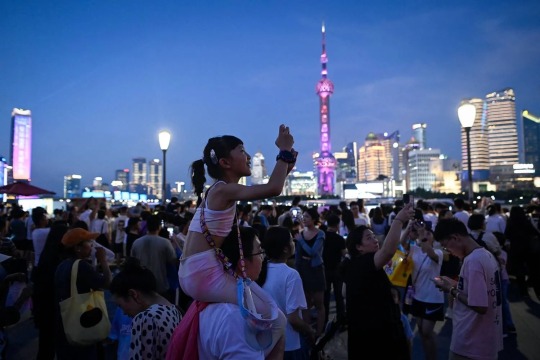
A child sitting on a man's shoulder takes a picture as she visits the Bund waterfront area in Shanghai, China, on July 5, 2023. Wang Zhao/AFP Via Getty Images
Midway into my just-completed one-month stay in China, I found myself seated alone in a tasteful restaurant in an upscale shopping mall in Shanghai, where I had gone for dinner.
There, amid dim lighting and soft traditional music, I had a kind of revelation. Bear with me. Against the opposite wall sat a three-generation Chinese family dining together. Two grandparents, slouching a bit, their visages deeply lined, faced in my direction, and seemed to exhibit mild curiosity about what has become a rare sighting recently, even in China’s most cosmopolitan city: a foreigner. They watched closely as I spoke with the waiter in Chinese to complete my order.
Two other people—from all evidence their much taller daughter, who was dressed in the refined way of a well-paid professional, and a small grandchild—sat with their backs to me. I was only able to see their faces when the mother stood up mid-meal to take her girl to the bathroom. In this little glimpse of three generations, an entire world opened up for me, as did a deep sense of alarm over one of the most urgent problems facing all of humanity in these times.
As a former longtime resident of China and someone who has been studying the country since I was a college student many decades ago, I could not prevent myself from trying to imagine the run of experiences the two elders had lived through. I guessed they were roughly my age, meaning in their 60s, but they looked a lot older and more worn than your average well-kept American of similar age.
This meant they would probably have harsh memories of the Cultural Revolution, the decade of political violence and upheaval that began under Mao Zedong in 1966. They or their families may also have suffered even worse tribulations late in the previous decade during the “Great Leap Forward,” when Mao’s crash effort to industrialize resulted in tens of millions of Chinese people starving to death.
Now, the elderly looking man who gazed across the narrow space separating us wore a light blue Gap t-shirt as he picked his way gingerly through a three-course meal, seemingly taking his time to chew. What did he understand of the symbolism of mass consumerism represented in the white logo emblazoned on his shirt? What did he make of the proliferation of this temple of marketing and surplus that is the shopping mall, a cultural phenomenon that contemporary China has made its own? How did he feel about the long curve of his life? Of the grave errors that China had made, but also about where it had ended up, or at least where it stood in this moment? I almost wanted to ask him, but thinking it would have been too much of an intrusion, I restrained myself, with regret.
In those moments, these thoughts impelled me to think about the curve of life in my own country, the United States, too—of how easily one can assume a kind of superior or even triumphalist attitude toward other people in other places. I had just missed being of draft age in the Vietnam War, a senseless tragedy visited upon tens of millions of Southeast Asians, for reasons as specious as many of Mao’s economic and political ideas. I thought of the persistent denial of civil rights for African Americans, which continued in a de jure sense almost into my teenage years. I thought of the devastation to the planet caused by America’s heedless crusade for wealth. Then, based on the evidence, I concluded that bad decisions and human folly are, well, universally human.
The biggest human folly I can presently think of, though, would be something that nowadays seems frighteningly easy to imagine: a war between the United States and China. Until the coronavirus pandemic, I had either lived in or visited China every year since the late 1990s. I plan to write several columns based on my recent return to the country after four years of pandemic-enforced absence. But this is not yet the occasion for a deep exploration for the political, economic, and strategic issues that are pushing to the two countries so far apart and fueling ever greater risk of catastrophe.
I’ll just say here that this is not a situation where, as so many in each country may be inclined to think, if only the other side would stop doing things that threaten or provoke us, the war clouds would dissipate. We have problems together, and if they are to be prevented from causing mass death and destruction, both countries will have to escape the endless loop of reflexively problematizing and sometimes essentializing the other, along with the relentless self-justification.
Many will think me naive, but this has to begin with something all too rare. Americans and Chinese have to rehumanize each other in terms of the way we conceive of our problems and engage. Actually, seeing people in China, like that family across from me at dinner, helped bring this home. But how can this be achieved for the crushing majority of Americans and Chinese who will never visit the other’s country? How can we strip off the layers of surface things that separate us to get in touch with the profound humanity that should unite us? It’s hard work, and the answer is not obvious, but it is urgent.
Since I’m ready to be accused of naivete, I’ll try to start first. There is almost nothing that is worth a war between the United States and China. I’ll come back to the tricky sounding “almost” in a second—it’s actually not as big of an asterisk as some might imagine. Control over Taiwan, which the government of Chinese President Xi Jinping has made into an all-too-public obsession, is not worth the killing that would be unleashed by a Chinese invasion and by any U.S. response in defense of that island. Continued U.S. geopolitical preeminence in the world is also not worth a major armed conflict with China. This is not a call for capitulation, but rather for both countries to find ways to prioritize coexistence and avoid disaster.
As a non-academic historian, I read an inordinate amount about the past, and I have always been struck by the airs of overconfidence and intoxication that have preceded many great past conflicts. On the eve of World War I, for example, elites on both sides—in Germany and Britain—were blithely predicting the troops would be home by Christmas.
Most Americans (and most Chinese) probably spend precious little time thinking about what war would do to their own country. It would be useful to give a wider airing of war game scenarios, such as one carried out recently by the Center for Strategic and International Studies, that make clear just how devastating a conflict could be. In this example, just one of many, Hawaii, Guam, Alaska, and San Diego, California, would all come under withering Chinese attack, up to and potentially including with nuclear weapons. Lest Chinese people think that they would have little to fear by way of direct impact, just for starters, many areas of coastal China, where the country’s population and wealth are heavily concentrated, could face a rain of U.S. missiles.
What are people willing to concede in order to avoid such a fate? In a book I wrote about China’s conception of itself as a great power, I concluded that the United States needed, for starters, to signal a lot more serenity in its competition with China. For at least two decades, my country has behaved as if a bit haunted by the prospect of being overtaken. But for objective reasons—including China’s extraordinarily profound demographic problems, the declining effectiveness of China’s economic policies, and a plethora of domestic challenges in the country—the United States needn’t be. What is more, though, is that the signals of American anxiety, which are rife in the political culture and come through in many U.S. policies, fuel Chinese nervousness, insecurity, and over-assertiveness.
China, for its part, needs to get over its own insecurities. The air of self-confidence it seeks to project is powerfully belied by the constant resort to overt nationalism and to assertions that in its dealings with other countries—or with international bodies like international tribunals governing laws of the sea, for example—only others are capable of incorrect positions. China, by contrast, is not only always right but also righteous.
Beijing is profoundly worried about the staying power of its own political system, but it needn’t obsess, as it claims to, over the supposed efforts of others to undermine it. Whatever threats there are to China’s system of rule come from within China itself. Nobody outside of the country, in other words, is trying to bring down the Communist Party. Only the party itself can achieve this, by failing to reform in step with the desires of the country’s own population.
So how can we restore some confidence on both sides? First the asterisk from above. War should be ruled out except in the case of a direct attack by one side on the other, which means we should rule out attacking each other. China should meanwhile also lower the temperature on Taiwan, in tandem with more reassurances from the United States that Washington does not support the idea of formal independence for the island.
Chinese and American leaders also have to start speaking with each other and meeting much more often face to face. There is really no substitute for this, for as much as what were once called people-to-people exchanges can reinforce a shared sense of humanity, seeing political leaders shake hands and smile and meet across the table to discuss thorny issues separating the two sides can also remind both countries’ public and political classes that there is nothing so hard that it can’t be talked about.
— Howard W. French is a Columnist at Foreign Policy, a Professor at the Columbia University Graduate School of Journalism, and a longtime Foreign Correspondent. His latest book is Born in Blackness: Africa, Africans and the Making of the Modern World, 1471 to the Second World War.
#Foreign Policy#China 🇨🇳 | United States 🇺🇸#Worthless War#Howard W. French#Argument#Cultural Revolution#Vietnam War#Mao’s Economic and Political Ideas#Political | Economic | Strategic Issues#Taiwan 🇹🇼#Hawaii | Guam 🇬🇺 | Alaska | San Diego#Beijing | Washington
13 notes
·
View notes
Text
I was tagged by Lise, Lin and Ander (aka @acrazybayernfan , @thommi-tomate and @miasanmuller) to do this veeeery interesting tag game! thank you all 🤗
What's your top 10 most memorable bayern matches?
In no particular order:
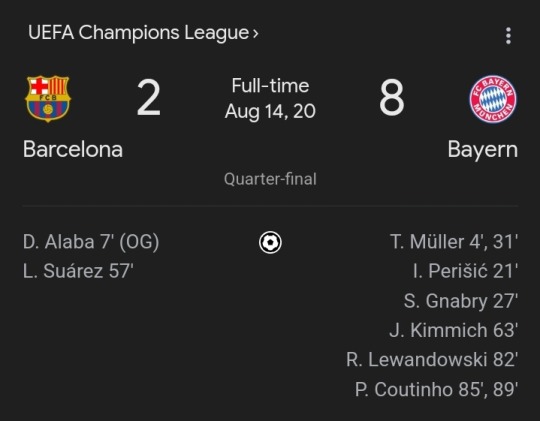
8 - 2 vs Barcelona: I mean, pretty self explanatory. It was like our 7 - 1 in brasil 2014.

5 - 1 vs Wolfsburg: literally who would've thought we'd witness a literal world record happen in front of our very own eyes in less than TEN MINUTES? that was absurd but in a good way! till this day i feel bad for vfl's keeper to the point i remember his name JAJAJJA
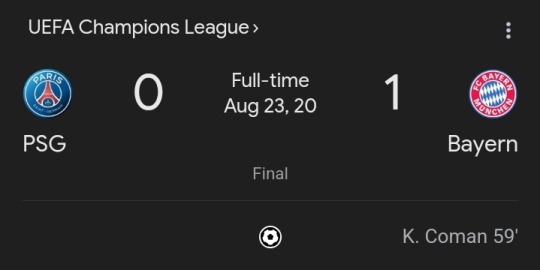
1 - 0 vs PSG: i was going through some stuff around that time (and believe it or not it wasn't because of the pandemic or anything related to it) so i was really not with my head in the game sort of speak, i literally watched the match in zombie mode until the goal happened and there i woke up a little and then when the match ended i bursted out crying JAJAJJA, it was like the perfect occasion to release emotions and it literally brightened my day, it was just what i needed that moment!
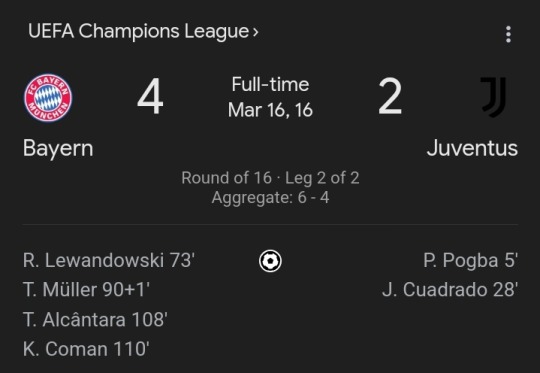
4 - 2 vs Juventus: i legit have this match downloaded on my laptop, in fact i watched it fairly recently! it's just the fact that we literally had ALL THE ODDS against our favor, losing during 90 minutes only for thomas to score literally on stoppage time AND THEN secure the match in less than two minutes? that was WILD! probably the most memorable in my book.
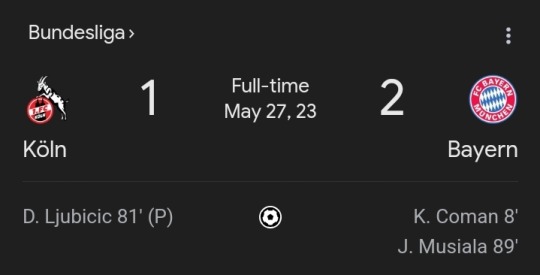
2 - 1 vs Köln: look, for the sake of transparency i didn't watch the match when it happened. It's not that i lost hope but rather they played very early and i prioritized my sleeping time 😂 but idk how effective that was since i slept like shit knowing deep down this was the title defining match going neck to neck against the bees nonetheless! but surprisingly i woke up just when both matches ended and i remember asking here "WHAT HAPPENED" and someone said "we won bundes!!" and then seeing the dash's reaction and finding out we won during the last minute + the bees blew it.... my jaw hit the floor omg.
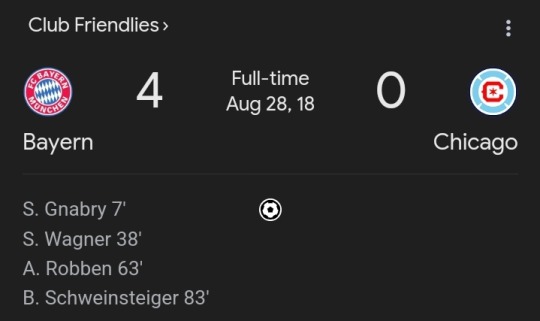
4 - 0 vs Chicago Fire: I know this was a friendly but it was Bastian's farewell match and dude..... it was so emotional. Seeing him cry his heart out in a dim light stadium where everyone were cheering on him while a spotlight focused on him was just too heartwarming. Seeing club legends retire is never easy so i hope that doesn't happen ANY TIME SOON 😭

2 - 1 vs Dortmund: now this one is extra special because at the time i was familiar with bayern thanks to mr bavaria but i wasn't exactly a die hard "must watch every match" kind of fan, it was more of a casual thing and i remember coming back from school or something, turning on the tv and i swear to GOTH literally thirty seconds later robben scored and i was so confused about everything until the match ended and i was like "oh, they won a trophy, that's nice :))".......it was later when i realized the importance of the entire thing 🤪
vs Villareal: now i know this sounds weird but like, there hasn't been a day where i don't question myself "how the everloving fuck did we lose against them?". ALL THEY DID was make all eleven players defend their area, that's literally it.... AND YET WE COULDN'T BEAT THEM! I AM STILL DUMBFOUNDED AND CAN'T GET OVER IT.

1 - 3 vs Liverpool: once again.... i know this is odd given bayern lost...... but these are my two favorite teams of all time. I remember when it was announced both teams were playing against each other i felt personally attacked, i literally couldn't decide who to cheer on, every goal felt bad, every attack felt bad, and seeing how bayern lost in horrible fashion it was like... i couldn't even celebrate for lfc, i was in neutral mode and it was wild. At least it eventually led lfc to win ucl but still, it was 180+ minutes of double tension 😵💫
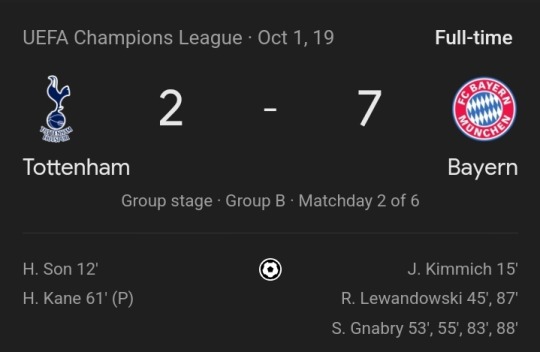
7 - 2 vs Tottenham: honestly how can you forget this one? it was absurd! serge came out for blood that day, against the sp*rs nonetheless!!!! i know we always joke about bayern destroying london teams but this was just unexpected, right now i feel like rewatching 😂
I'm pretty sure i'm missing one or two matches that shook me to the core, but i guess these will do rn. It was fun!
Tagging people from my latest bayern gifset because i know everyone has been tagged already so feel free to ignore this if so: @fabioquartararhoe @probayern @chelleisamazing @youknowitsworthfightingfor @dieclownschaft @gxtzeizm @uncoolfc @fcbalding @shrimpeon @be-lucky-again @colorsofmyseason @angry-pinscher @miss-i-ship-it and whoever wants to do this! just say i tagged you and you're it! :D
#ask games#yaay!#sorry for the eternal rambles 😫#i prefered not to read your options first so i wouldn't be influenced!!
11 notes
·
View notes
Text
Starter for @amarvelousmencgerie !

Jill Valentine stands alone outside the LAPD Pacific Branch Station looking north.
She sees Santa Monica Pier, a festive and joyous setting despite the recent disrepair, the famed terminus of the iconic Route 66.
Beyond it lie the Santa Monica Mountains, separating The Valley from Westside and the LA Basin. A National Recreation Area designated just about ten years ago, and one of the most visited places in the whole metropolitan area.
But Jill knows there's a darker side to those sunny mountains.
During the late interwar years and into early World War II the German-American Bund, an organization formed to drum up sympathy for 'New Germany' by recruiting Americans of German descent and converting them to National Socialism, operated out of those hills. Nazi spies were pulled directly from its ranks, and rumor has it there's an abandoned bunker still there left uncompleted after the ring was busted by Leon Lewis and the Los Angeles Jewish Community Council.
Jill knows there is. She's seen it with her own eyes.
In the 60s, the Santa Monica Mountains were also home to Spahn Ranch, the home base for the infamous 'Manson Family', and the location where they carried out the Tate-LaBlanca Murders in 1969.
Evil dwells in those hills even to this day, calling out to those foolish enough to heed its Siren's Call.
A girl from Malibu went missing in the Santa Monica Mountains about a year ago. Missing persons would usually be the purview of the police and search and rescue, but after they made no headway and started noticing suspicious activity on the San Fernando Valley side, concerns arose there was more to this disappearance and the case was handed over to the Special Tactics and Rescue Service, Los Angeles-Pacific Branch.
Intel would seem to indicate that now, the Nazis are back, and are using the site to conduct their own spin on the Umbrella Pharmaceuticals eugenics program. The missing girl, a perky blonde athlete and heiress name of Kara Stark who moved to Malibu from New York to take up competitive surfing, is exactly their type.
This makes it the concern of the International Bioterrorism Task Force as well.
Jill just stands on the beach and takes it all in as she waits for her comrades to fly in from Geneva and Raccoon.
After that, it'll be up to her and Captain O'Brian to lead them all into darkness.
#ic.#Übermädchen.#amarvelousmencgerie#cw: nazis#cw: murder (mentioned)#cw: The Manson Family#cw: military#cw: war#cw: kidnapping
2 notes
·
View notes
Text
Yule Witch Market
Sunday Dec 11th, 12pm-6pm
Diversity Richmond (Sherwood Ave)
If you're in the Richmond VA area this weekend, pop on over to Diversity Richmond for the 4th Annual Yule Witch Market! There will be hot tea and cocoa, tarot readers, and dozens of vendors will all sorts of wonderful witchy wares for sale. It's a perfect one-stop shop for all the witches on your holiday list...including yourself!
See you there! 😊

51 notes
·
View notes
Text
by amita chaturvedi and syaahi team
On how Maitreyi Pushpa tears up Bundelkhand and pastes it back together in her stories. This article is part of our series on marginal literary cultures in regions often unjustly collapsed with the category of ‘Hindi’.
Surrounded by the valleys of Vindhyachal, Bundelkhand stretches across Uttar Pradesh and Madhya Pradesh. It spans a varied geography and an even more diverse social and cultural milieu. The region has been home to many tribes including the Raut, Bheel, Sahariya, Shabar, Kol, Nishad, Pulind, Kirad, Nag, and others; each with their own distinct languages. Sounds of Danghai, Chaurasi, Pawari, Vidishiya echo in different slices of the expanse. Bundeli is pre-eminent.
Literary tradition in the language dates back almost seven centuries. The epic Alaah-Khand song- style holds a special place in its literary canon despite being in the oral form. Composed by the Bundeli poet Jagnik, the invocation is sung in rural areas on the days of heavy downpour. The prose of Mahabharata and Ramayana written by Vishnudas are also important windows into the canon.
Despite a rich history, Bundeli has not been accorded the same respect as other languages within mainstream literary discourse. But that hasn’t stopped the brilliant writer Maitreyi Pushpa from placing the tongue at the heart of her works. Her 1999 novel Idannamam (This Is Not Mine) published by Rajkamal Prakashan is especially significant in this context. While at some terse points it ties Bundelkhand’s urban and the rural, Idannamam offers a replete depiction of the rural. It is the rural that becomes the primary space for Bundeli to reside in the fiery novel. The language pulsates fluently in the novel, identifying with the daily life and grainy textures of the region it flows within. Pushpa also brews life into her characters by paying attention to the story’s soundscape. Characters converse in Bundeli. Folksongs weave freely in and out of the narrative.
Mandakini, the protagonist of Idannamam, is a woman eager to help the people of her village in resolving their problems. Her own burdens mount heavy. The stories composing her village unfold alongside that of Mandakini’s. Her grandmother Bau always stands by her. Bundeli primarily resurges in the words spoken by Bau and other elderly characters, signifying a generational shift from Bundeli to Hindi, a transformation familiar to many northern areas in India.
The narrative of the novel has been written in Khari Hindi. Modern Hindi literature, which typically utilizes Khari Hindi, can be at times devoid of the grainy sounds common to specific linguistic contexts. Khari Hindi is, at certain points, unable to root itself in local realities. It floats above. It sounds, literally, disconnected to the people in the narrative. Literature attempting to carve out the daily that pulls out tonalities unique to a place can then strike the right chord. How we talk to one another is deeply bound up in how we experience life amongst each other. People, their rituals, their labour, their environment, their beliefs, their relationships. All of these and more inform how they speak about their lives. Bundeli, then, is the passage they walk through to make sense of their world.
Accomplished Hindi writer and publisher Rajendra Yadav, in his introduction to Idannamam, notes
Amidst the refined and bland language of the Hindi fictional literature, Maitreyi has written the story of this village in the natural style of folk literature, as if Manda and the people around her are speaking their own minds- in their own language and dialect, with a Bundelkhandi rhythm… amidst the rumbling of crushers and tractors around them.
The rhythm of their life, Bundeli, resounds between the humdrum of their transforming world.
Having spent most of her early life in Bundelkhand, Pushpa is well versed with not only the language but the social world it finds itself in. The folk songs she strategically makes use of in Idannamam are a testament to this knowledge.
In one moment, a prayer sung in Bundelkhand appears in Idannamam
Vindhya Pradesh zila Tikamgarh,
Nagar Orchha gram,
Ki Janhh Raaje Siri Bhagwan.
(Vindhya Pradesh, district Tikamgarh,
City Orchha town,
Where sits Lord Almighty)
The song drops the reader right where God sits.
In Bundelkhand, verses of valour are far more prevalent than songs of courtship or marriage. Idannamam includes a song of courage which is part of the legion of Suata. In the region, Suata is sung by girls as performances known as Suata Khelna (Playing Suata).
Suata, also known as Naurata, is an important Bundeli festival. It arrives in the Hindi calendar month of Kwaar (typically falling in the Gregorian period of September to October). Young girls collectively worship and play Suata at the dawn for nine continuous days. One of the songs from this tradition is given space in the novel. Though the song does not lend to the narrative’s movement, it offers a fuller life for the story’s characters. A life closer to their own.
Tin ke phool tinahi ke daane,
Chanda uge bade bhunsare.
Sare baare phool siraye,
Kaath kathile kaathe se,
Paanch bhaiya panda se.
Chhoti behen ingur si.
(Whosever are the flowers, the seeds belong to them, The moon rises at early dawn.
All the flowers are floated in water,
With bodies as strong as wood,
All five brothers like Pandavas.
Sixth sister is like vermilion.)
Similarly, “Kartik Nahana” (bathing in the month of Karthik or October to November) is another ritual observed by rural women who visit a local well together to bathe and pray.
Kanhaiya mangta daan dahi kau, Nahaat mein cheer hare sab hi kau, Gopika kyun itrani re.
(Kanhaiya asks for curd, Steals the clothes of Gopikas while they bathe, Why do they get flattered)
Women are prohibited from telling lies to each other during Kartik Nahana. They must reveal private information about their lives such as their sexual relationships with their husbands or other men to successfully complete the ritual. Hiding is a sin. Although the example depicted in the novel could be symbolic of the sexual liberation of women, it could also be interpreted as notions of sin and interior privacy for a woman in Bundelkhand.
Apart from exploring the complex lives of women characters in Bundeli, Pushpa has also provided a very lively description of the visual expanse looming large in Idannamam. Rivers, hills, dams, homes, vegetation, moors. Bundeli becomes the architect of and architecture for the body of Bundelkhand.
“Ja biyaban ko kya kahain! Raat ke samay ye bharka nahin dikhane the. Matti ke jitek unche dunh, utek hi neechi khaai! Ped na ruukh! Katile jhund-hi-jhund!”
(What to say about this desert! These dunes are not visible during the night. The cliffs are as deep as the dunes of soil are high. Neither any trees nor a bush! Only thorny shrubs everywhere!”)
Pushpa also leaves open and bare in plain sight the political and economic webs swallowing the region. Her rural characters are forced to rely on people and institutions in the city for exercising political maneuvers, negotiating legal issues, and, of course, seeking medical treatment. Through this asymmetric exchange, the protagonist Mandakini reckons with the absence of village infrastructure and the gulf that exists between the rural and the urban.
The construction of a hospital in the novel is intrinsically linked to Mandakini’s life. Infrastructure is embodied within her character. In the narrative, Mandakini’s father is responsible for the hospital. The first of its kind in the village. But playing to her authorial strengths of heightened drama, Pushpa engenders a sequence wherein her father is murdered by political strongmen. A stampede ensues. Many die. A life-saving hospital is inaugurated with a blood bath. A child at the time of the tragic event, Mandakini grows up determined to realize her father’s vision. To restore the hospital and mitigate the reliance of the people in her village on largely inaccessible urban infrastructure, all while mending her own inner turmoil.
Language, once again, becomes the fulcrum for this commentary. Bundeli and Khari Hindi constantly collide in the form of conversations between rural and urban characters. These conversations are centered on corruption, electoral battles, economic anguishes, political promises, and other issues the region faces even today.
The crushers and tractors Rajendra Yadav spoke of also point to a larger process within the novel of ecological loss and resultant economic turmoil. Tribal communities and labouring farmers have lost their lands, their homes, their source of livelihood to exclusionary development. The blasts at the crushers. The explosions. They all also pose a threat to the communities’ safety. Workers at crushers too fall to a plethora of health problems like asthma and respiratory issues, tuberculosis, and others.
Idannamam also raises challenges faced by Bundelkhand’s Scheduled Tribes and adivasi groups. With the government acquiring quasi-ownership of the forests, the tribal population has faced displacement and economic crisis. Tribal communities of Bheel, Sahariya and Raut who traditionally survived on hunting and tree-logging are redeployed as cheap labour exploited by public and private sector contractors. Mandakini also struggles to get employment opportunities for the residents of her village.
Hindi and Braj language poet Dr. Dhirendra Verma has written in Hindi Sahitya Kosh,
A writer very cautiously includes the regional landscape, nature, climate, festivals, folk-songs, specific conversational styles, idioms, sayings, specificities of dialects, specific behavioral and natural qualities of people, their romance, moral beliefs etc. to depict regionality in their work.
In Idannamam, this cautiousness translates not to the inclusion of regional particularities but the universal spirit of the novel. Despite containing all the elements of regionality, Maitreyi Pushpa does not regard Idannamam as a regional novel. In an interview to this writer she said,
Idannamam is a novel of Bundelkhand region and therefore it can be regarded as a regional novel. But it is not regional at all. This novel is being taught in the entire country. People everywhere consider it as a sociological novel rather than a regional novel. Today the condition of all villages is the same as that of the villages in Bundelkhand. That’s why I consider it as novel of the entire country because it is related to the entire country. It belongs to the entire nation.
This quality of transcending boundaries, whether linguistic or cultural, jumps out of her novel. It is because she affixes her narrative so strongly within a specific context, that she can reveal universal notions. The rural, especially, is highly local and yet evokes the hierarchies and struggles inherent to rural life across northern India. And this evocation would not be possible without Maitreyi Pushpa prioritising Bundeli.
Screenwriter and playwright, Javed Siddiqui in a discussion on Urdu said that your tongue is that which you dream in. We dream and think through language. Our literature exemplifies this. It is, then, crucial to empower regional languages and tongues like Bundeli and understand their capabilities for pushing creative boundaries of the literary space. Only then will we able to dream bigger and better. Only then will we be able to say that literature is indeed ours.
19 notes
·
View notes